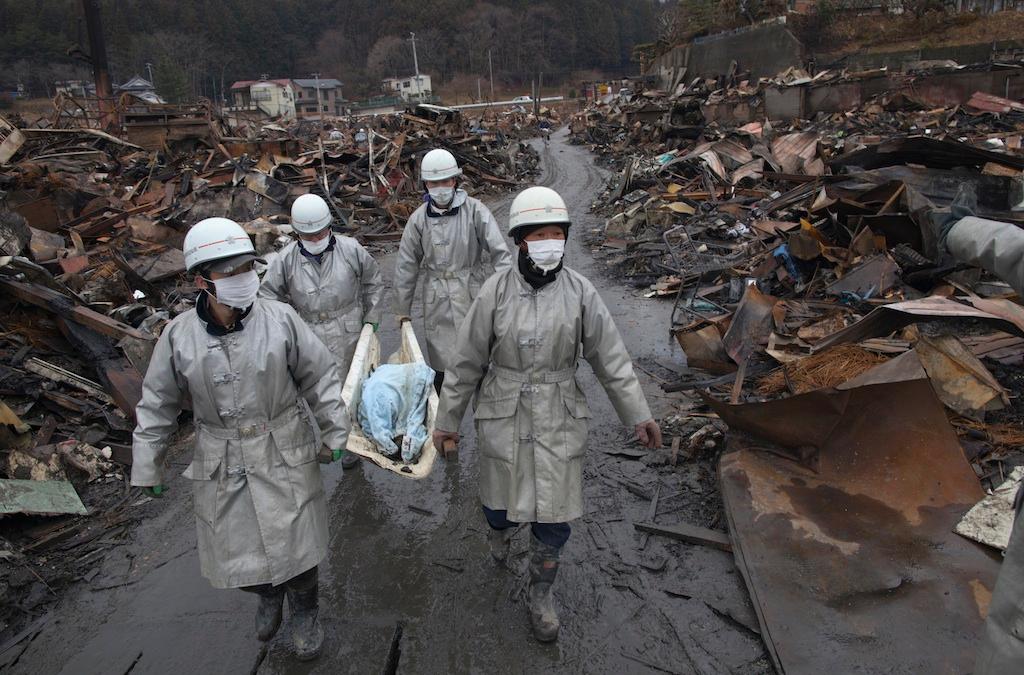Japan takes desperate steps to cool nuclear reactors (UPDATES) (VIDEO)
Rescue workers carry a charred body from the rubble of a village destroyed by Japan’s devastating earthquake and tsunami on March 16, 2011, in Kesennuma, Miyagi province.
Japanese authorities experimented with new measures Thursday to bring the country's stricken nuclear power plant under control, as the United States gave a dire assessment of the nuclear crisis and warned radiation levels at the plant are "extremely high."
Operators of the Fukushima Daiichi power plant, where explosions and fires have hampered efforts to cool overheating reactors, began using helicopters to dump water on the reactors and said they were close to finishing a new power line, AP reports.
But early reports said efforts to dump tons of water on reactor No. 3, which reportedly experienced damage to its containment vessel during an explosion earlier in the week, had failed to bring down radiation levels
Japanese officials said they were hopeful the plant's operator, Tokyo Electric Power Co., can bring power back to the plant, which would enable the plant to restore its cooling systems that broke down during Friday's devastating earthquake and tsunami.
However, the United States has given a less optimistic view. In a break with one of the country's biggest allies, U.S. officials gave a much more severe assessment of Japan's nuclear crisis Wednesday.
The chairman of the U.S. Nuclear Regulatory Commission told Congress that he believed all the water in the spent fuel pool at the No. 4 reactor at the plant had boiled dry, leaving the fuel rods exposed and bleeding radiation, reports The New York Times.
The congressional testimony by Gregory Jaczko, the chairman of the commission, combined information gathered from Japanese officials as well as independent data.
“We believe that radiation levels are extremely high, which could possibly impact the ability to take corrective measures," he said.
After the hearing, Jaczko told reporters, according to AP: "My understanding is there is no water in the spent fuel pool. I hope my information is wrong. It's a terrible tragedy for Japan."
If the assessment of the situation is accurate, radiation levels would make it difficult to fix the No. 4 reactor as well as service the other reactors at the plant. Workers could then be forced to completely vacate the plant, and the fuel rods and spent fuel pools would be left to meltdown, The New York Times states.
After two fires and multiple explosions at the plant, radiation levels reached the point Wednesday where workers at the plant had to withdraw and temporarily suspend operations.
As a result of Jaczko's assessment, the White House recommended Wednesday that U.S. citizens stay about 50 miles away from the plant, the Los Angeles Times reports. Japanese officials recommended people evacuate from a 12-mile area around the plant. Anyone within 20 miles of the plant, they said, should remain indoors with the windows shut.
The British government Wednesday followed France in urging its people to leave not only the disaster zone but also Tokyo for fear of potential disruptions to food and water supply, transport, power, communications and other infrastructure, AFP reports.
The chief of the U.N.'s International Atomic Energy Agency, Yukiya Amano, planned to arrive in Japan on Thursday to carry out an independent assessment.
Earlier, Japan's Emperor Akihito made a rare public address saying he was "deeply concerned" about the nuclear crisis facing his country.
Akihito, 77, said he was praying for the safety of survivors of the disasters that are feared to have killed more than 10,000 people, urging them to work together to overcome adversity, the BBC reported.
"People are being forced to evacuate in such severe conditions of bitter cold, with shortages of water and fuel… I cannot help praying that rescue work is done swiftly and people's lives get better, even a little," he said, according to AFP.
More than 10,000 are expected to have died during the disaster, and 450,000 are now homeless and living in temporary shelters, reports BBC. Many face shortages of food, water and supplies.
— Hanna Ingber Win, Barry Neild
